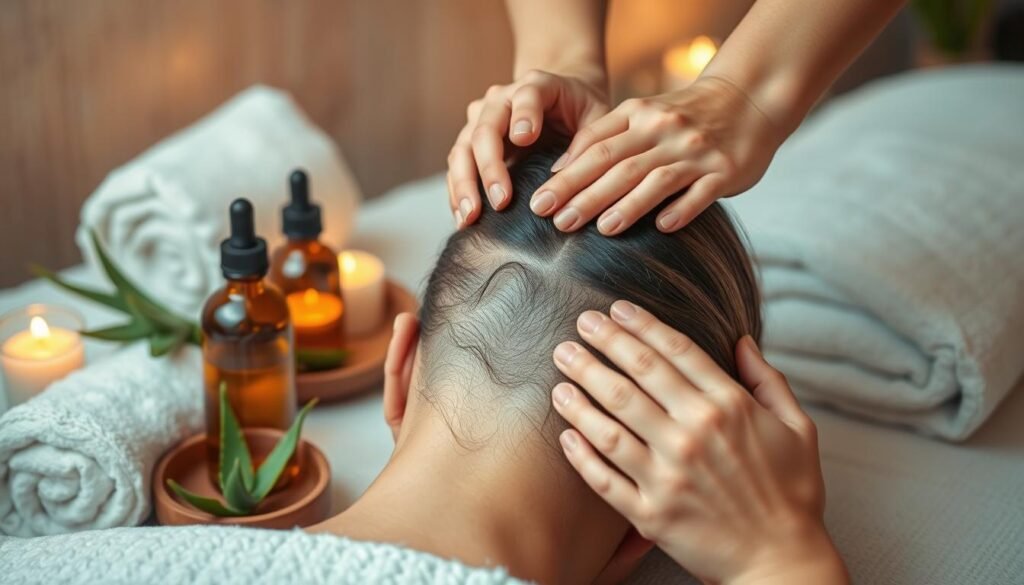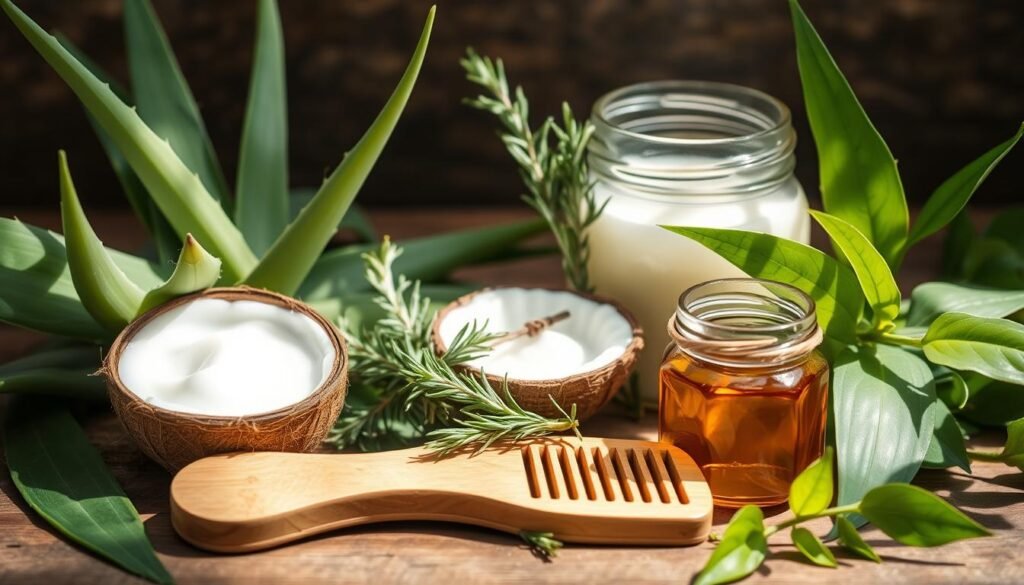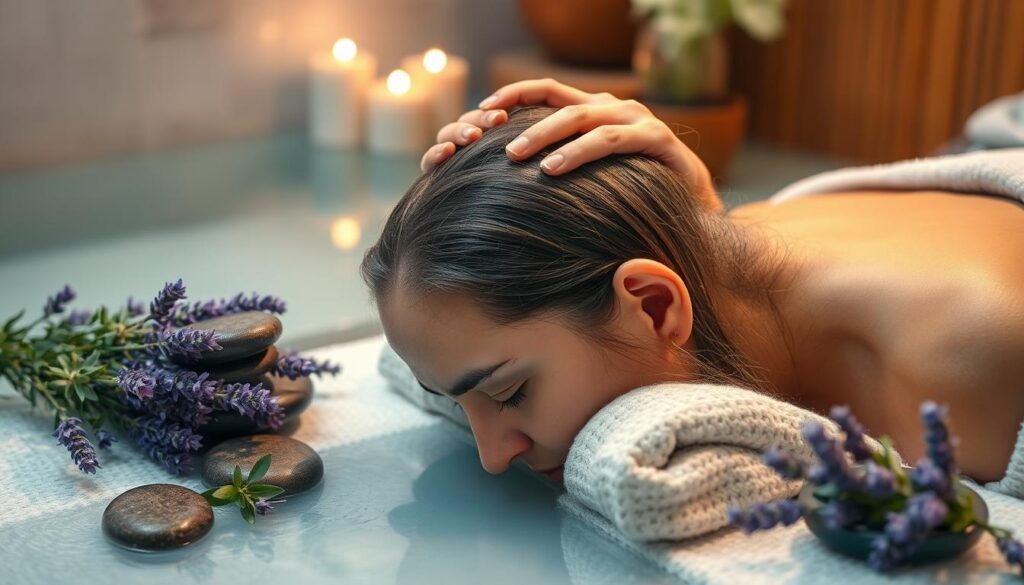Did you know nearly half of everyone will get dandruff sometime? This fact shows how common dandruff is. It affects how your scalp looks, your overall health, and even your confidence. This article will share ways to ease scalp tension and fight dandruff. Doing so can make your scalp healthier and improve hair growth.
Starting on a healthier scalp journey means knowing what causes discomfort and dandruff. We’ll show you natural remedies and specific treatments to reduce tension and keep your scalp nourished. If you’re looking to better your scalp care, try products from the Design Essentials® range. They can greatly help with these issues.
Key Takeaways
- Nearly 50% of people globally experience dandruff at some point.
- Tension relief for the scalp promotes healthy hair growth.
- Natural ingredients are effective for maintaining scalp health.
- Stress can worsen dandruff symptoms in many individuals.
- Targeted treatments can significantly reduce dandruff severity.
Introduction to Scalp Health
Keeping your scalp healthy is key to feeling good and growing healthy hair. The scalp has five layers of tissue and about 100,000 hair follicles. It’s important to take care of it to avoid dryness, itching, and dandruff. Washing and conditioning regularly helps keep the moisture level right, keeping your scalp healthy.
A hydrated scalp makes sebum, which keeps hair and skin conditioned. But, many factors can cause a dry scalp. Things like genetics, dry air, too much washing, and getting older are common reasons. Also, hormonal changes, like those during menstruation, can make the scalp oilier.
Dandruff is often seen more in women and spikes during puberty. But it usually lessens after age 50. Using scalp treatments like masks and exfoliation monthly can reduce flakes and itching. Choosing hair care products for your scalp type is key. Products with salicylic acid and antioxidants are great for your scalp.
Stress also plays a big part in scalp health. It can mess up the skin’s barrier and cause more oil production. This leads to yeast growth. Keeping good hygiene and managing stress can help you keep a healthy scalp.
| Factor | Impact on Scalp Health |
|---|---|
| Genetic Predisposition | Increases likelihood of dry scalp and related conditions |
| Environmental Conditions | Dry air can exacerbate dryness and flakiness |
| Washing Frequency | Excessive washing can strip natural oils |
| Aging | Reduced sebum production leads to dryness |
| Hormonal Changes | Influences oil production and scalp oiliness |
Understanding Dandruff and Its Causes
Dandruff affects about half of the people around the world. It leads to itchy and flaky skin on the scalp. It can also spread to the eyebrows, beards, and shoulders. Causes of Dandruff are many, including oily or dry skin, reactions to hair products, and a certain fungus. This issue usually starts in young adulthood and can go on for many years.
Dandruff is seen more in men than women. Diseases like Parkinson’s and other conditions that weaken the nervous or immune system can increase dandruff risk. Its main symptoms are visible flakes and an itchy scalp. These symptoms often get worse in cold, dry weather.
For mild dandruff, which is often called seborrheic dermatitis, there are many treatment options. Regular or medicated shampoos with special ingredients like pyrithione zinc can help. Most people manage dandruff on their own, without needing a doctor. Teens face the same dandruff issues and treatments as adults.
Signs of Scalp Tension
Knowing the signs of scalp tension helps keep your scalp healthy. Catching these signs early means quicker treatment and better scalp well-being. Some key signs are an itchy scalp, irritation, and discomfort. You might also feel more sensitive in certain spots, worsening conditions like dandruff.
Conditions like dermatitis can make scalp pain worse, especially with harsh chemical products. Things like folliculitis or fungal infections can cause warmth or pain. In kids, these problems are quite common and can be very uncomfortable.
Lice lead to an itchy scalp and lots of scratching, causing red bumps and an oozing feeling. This needs quick treatment. Stress can also cause headaches that feel like scalp pain, due to tension in the neck and shoulders.
Sunburn or hormonal changes can make your scalp feel worse, especially if your scalp is naturally oily or dry. Keeping your scalp clean helps keep irritants away and reduces signs of dandruff. Watch out for these signs:
| Symptom | Potential Cause |
|---|---|
| Itching | Dryness, product irritation, or infestations |
| Red bumps | Allergic reaction or lice |
| Pain | Folliculitis, tension headaches, or dermatitis |
| Sensitivity | Environmental changes, hormonal fluctuations |
Washing your hair regularly is key to removing irritants, for a more comfy scalp. Visit this site for more on scalp care. Products for dry scalp can help too. Spotting scalp tension symptoms early helps make your scalp more comfortable and prevents further issues.
Tension Relief for Scalp and Dandruff
Getting Tension Relief for Scalp and Dandruff helps your scalp feel better. There are many ways to make your scalp more comfortable. One key way is to massage the scalp with natural oils. This can improve blood flow and reduce tension.
Adding relaxation methods to your day, like meditation, is beneficial. While stress does not cause dandruff directly, it can make it worse. Therefore, managing stress is crucial. Doing things you enjoy, such as exercising and eating well, can not only fight dandruff but also improve your mood.
Using special scalp treatments is also important. Products like Design Essentials® Scalp Care Anti-Itch & Tension Relief Scalp Butter help a lot. They use a mix of natural oils to calm the scalp. Another helpful product is the Design Essentials® Peppermint & Aloe Therapeutics Anti-Itch Shampoo. It refreshes the scalp and eases itching.

Trying different Soothing Scalp Treatments is a good idea. Here are some treatments that work well:
| Treatment | Benefits |
|---|---|
| Design Essentials® Scalp Care Anti-Itch & Tension Relief Scalp Butter | Calms irritation and soothes dryness with natural oils. |
| Design Essentials® Peppermint & Aloe Therapeutics Anti-Itch Shampoo | Refreshes the scalp, reduces itchiness, and has soothing effects. |
| Coconut Oil | Helps moisturize the scalp and may reduce dandruff. |
| Aloe Vera | Offers soothing relief and can help with itching. |
| Tea Tree Oil | Provides natural antiseptic benefits for scalp care. |
Keeping your scalp healthy involves using the right treatments and being mindful. Starting a routine that includes these Soothing Scalp Treatments can make your scalp healthier and lessen dandruff symptoms.
Benefits of Scalp Massage
A scalp massage has lots of benefits. It helps you relax and makes your hair healthier. It boosts blood flow, eases tension, and makes you feel better overall. If your scalp often feels tight or sore, a good massage can help a lot. Studies have found that it can make your hair thicker and lower stress.
How to Perform a Scalp Massage
Doing a scalp massage is easy and doesn’t take much time:
- Start with clean, dry hair.
- Use your fingertips to apply gentle pressure on the scalp, moving in circular motions.
- Work your way from the front to the back of the head, covering all areas.
- Incorporate stress relief massage techniques by adding gentle kneading and tapping motions.
- Continue for 10-15 minutes to maximize benefits.
Doing this every day can really help your hair grow. It also reduces scalp tension.
Essential Oils for Enhanced Relief
Adding essential oils can make a scalp massage even better. They offer extra perks:
- Peppermint oil: Boosts blood flow and helps your hair grow.
- Lavender oil: Makes you feel relaxed and less stressed during the massage.
- Rosemary oil: Helps make your hair thicker and improves the health of hair follicles.
Using these oils can make your massage more special. They target specific problems, making them great for stress relief routines. Doing this regularly nourishes your hair follicles. It helps your hair grow healthy, keeping your scalp in good shape.
Natural Dandruff Remedies
You don’t always need store-bought products to fight dandruff. There are powerful natural remedies that can ease your scalp issues. Aloe Vera and Tea Tree Oil are great examples. They’re known for their ability to fight dandruff effectively.
Aloe Vera for a Soothing Effect
Aloe Vera is great for calming the skin. It keeps the skin moist and heals it. When you use Aloe Vera gel regularly, it can ease scalp irritation and feed your skin. It also fights the fungus that causes dandruff. People will find their scalp more hydrated and comfy.
Tea Tree Oil as a Natural Antiseptic
Tea Tree Oil is amazing for killing germs naturally. Studies show it can stop fungi and bacteria from growing on your scalp. One study with 140 women showed it really helps with dandruff. Just mix a few drops of Tea Tree Oil with your shampoo. This makes it a simple addition to your hair care.

| Natural Remedy | Main Benefit | How to Use |
|---|---|---|
| Aloe Vera | Soothing and moisturizing | Apply the gel directly to the scalp and leave it for 30 minutes before rinsing. |
| Tea Tree Oil | Anti-fungal and antibacterial | Add a few drops to a carrier oil or shampoo. Massage into scalp and leave for 15-20 minutes. |
Trying out these natural remedies could be a game-changer for your scalp. It’s a gentle way to deal with dandruff, without harsh chemicals.
Effective Dandruff Treatments
Dandruff can be annoying, but it’s manageable. There are many treatments including over-the-counter and prescription options. Knowing which to choose is key.
Over-the-Counter Anti-Dandruff Shampoos
Anti-dandruff shampoos from the store are usually the first step. They have ingredients to fight the causes of dandruff. These ingredients might include:
- Pyrithione zinc – It kills bacteria and fungus causing dandruff.
- Salicylic acid – Helps keep the scalp moist and reduce scales.
- Ketoconazole – A powerful antifungal for tough dandruff.
- Coal tar – Reduces how fast skin cells shed from your scalp.
- Selenium sulfide – Controls fungus and bacteria on the scalp.
Trying different shampoos may be necessary. If one stops working, switch it up. Using medicated shampoo regularly for a few weeks should show results.
Prescription Options for Severe Cases
If dandruff doesn’t go away, stronger prescriptions may be needed. Doctors might suggest:
- Fluocinolone – This corticosteroid decreases inflammation.
- Calcineurin inhibitors – They lessen inflammation and itching.
- Phototherapy – Uses ultraviolet light for hard-to-treat cases.
Talk to a doctor to find the best treatment plan. A good treatment plan can make a big difference for your scalp.
With the right treatment, you can take back control over your scalp health. For more information on dandruff management, click here.
| Treatment Type | Common Ingredients | Typical Use |
|---|---|---|
| Over-the-Counter Shampoos | Pyrithione zinc, Salicylic acid, Ketoconazole | Several times a week, depending on scalp type |
| Prescription Treatments | Fluocinolone, Calcineurin inhibitors | As directed by a healthcare provider |
The Importance of Scalp Exfoliation
Scalp exfoliation keeps the scalp healthy. It removes dead skin and unclogs hair follicles. This helps hair to grow better. If you have oily or dry scalp, or use lots of products, exfoliating can help. It makes the scalp more balanced and feels new again.
To exfoliate your scalp right, find a good routine. Start exfoliating once a week. If you have dandruff or your scalp is often oily, you can do it twice a week. But, don’t overdo it. Too much exfoliation can irritate your scalp and make problems worse.
There are many ways to exfoliate your scalp:
- Aspirin Scrub: Mix 6 to 8 aspirin tablets with 4 tablespoons of warm water for an effective scrub.
- L’Oreal Paris EverFresh Micro-Exfoliating Scrub: Uses apricot seeds and is gentle on your scalp because it’s sulfate-free.
- dpHUE Apple Cider Vinegar Scalp Scrub: With pink Himalayan sea salt and avocado oil, it soothes your scalp.
- Christophe Robin Cleansing Purifying Scrub with Sea Salt: Great for sensitive skin and includes sweet almond oil for nourishment.
- Paul Mitchell Tea Tree Hair and Scalp Treatment: This is a chemical exfoliant. It has tea tree oil, vitamin E, and shea butter to nourish your scalp.
After exfoliating, protect your scalp from too much sun. Wear a hat or use SPF products made for the scalp. This protects the sensitive skin there.
Adding scalp exfoliation into your routine makes your scalp feel new. It is a key step for healthy hair growth and scalp health.
Healthy Practices for Scalp and Hair Growth
To promote healthy hair and a perfect scalp condition, follow effective Scalp Care Practices. There are many strategies to make hair vibrant and keep the scalp healthy. Let’s talk about some important ones:
- Regular Hair Washing: Cleaning your hair often removes extra oil and buildup. Choose gentle shampoos without sulfates and harsh chemicals.
- Scalp Exfoliation: Try using a scalp scrub. It gets rid of dead skin and leftover products. This boosts blood flow and supports Healthy Hair Growth.
- Limiting Heat Styling: Use less heat on your hair. It helps avoid damage and breakage to hair and scalp.
- Nutrition for Hair: Eat foods rich in vitamins, minerals, and omega-3s to keep your scalp and hair healthy. Fatty fish, nuts, and seeds are great choices.
Our environment and how we live affect our scalp too. For example, too much sun can dry out the scalp. Pollutants might cause inflammation. See a dermatologist if you notice issues like flaky skin, redness, or unusual hair loss. By following these healthy practices, you can achieve strong, beautiful hair and a healthy scalp.
Stress Relief and Its Impact on Dandruff
Discovering how stress and dandruff are connected gives us insight into Dandruff Management. When stressed, our body reacts in ways that can make dandruff worse. For instance, stress pumps up cortisol which makes our scalp oily. This extra oil throws off the balance of scalp bacteria, causing itching and flaking.
Practicing Stress Relief methods like yoga and mindfulness can do wonders for Scalp Health. They reduce stress and blood pressure, bringing calmness. This calm supports a healthy scalp. Adding regular exercise into the mix not only relaxes you but also boosts blood circulation. This means more nutrients reach your hair roots.
Having friends to talk to can also help ease stress. It’s like the comfort of a warm shower but for your spirit. Changing your diet matters too. Eating more fruits and veggies instead of red meats and sweets can improve both scalp and hair health.
Using relaxation methods or getting help from a professional can boost your well-being. Check out how at Addressing stress. This goes a long way in managing stress and thus, reducing dandruff episodes. Plus, using products with ketoconazole, like in Nizoral®, helps by targeting the symptoms directly.

| Stress Relief Technique | Benefits |
|---|---|
| Yoga | Reduces anxiety and improves relaxation |
| Mindfulness | Enhances focus and lowers stress levels |
| Social Interactions | Provides emotional support and reduces feelings of isolation |
| Dietary Changes | Boosts nutrient intake beneficial for scalp health |
| Meditation | Promotes relaxation and reduces overall stress |
By including these activities in our daily routines, we’re not just fighting dandruff. We also improve our Scalp Health. This combined physical and mental health approach offers the best strategy for a healthy scalp.
Conclusion
Dealing with scalp health is key for those wanting Tension Relief for Scalp and Dandruff. Learning about dandruff causes like Seborrheic Dermatitis and Malassezia fungus is important. It helps people fight dandruff effectively. Many adults deal with dandruff, especially during major life changes.
Using recommended methods and natural remedies like aloe vera and tea tree oil is vital for good scalp health. Doing regular scalp cleanups and keeping clean can greatly reduce dandruff. It also helps hair stay healthy. Putting Importance of Scalp Health first helps with better hair growth and comfort.
To sum up, beating dandruff needs regular care, knowing the signs, and using the right treatments. Following these steps can lessen symptoms, boosting confidence and comfort. With the right knowledge, everyone can manage their scalp health and improve their life quality.